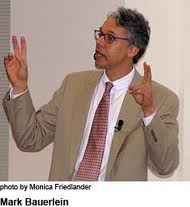Why do we want students to learn about the arts? Is it for their social benefits? Because they “save” students who are little interested in math or English? Because they teach tolerance for other viewpoints?
 Why are we all for arts education?
Why are we all for arts education?
I’d guess that many (most?) Arts Journal readers don’t even think about the why. We just know the arts are intrinsically wonderful. But are we making the best argument for arts in education?
Mark Bauerlein, an English professor at Emory University, doesn’t think so. In a recent post on his blog on Brainstorm, the group blog of The Chronicle of Higher Education, he offers “How Not to Save The Arts.” It refers, in turn, to an article he wrote for Education Next called “Advocating for the Arts in the Classroom.”
Bauerlein once worked at the National Endowment for the Arts (2003-05), under Dana Gioia, and he criticized current chief Rocco Landesman’s methods of advocacy:
[His] emphasis falls on the unusual student, the difficult kid, not on the arts as a subject for study. Landesman doesn’t defend arts education as a rigorous discipline that builds concentration and requires practice, practice, practice. Nor does he say, We need arts education to keep alive the legacy of American art–Thomas Cole, Martha Graham, Duke Ellington… He doesn’t highlight the provocative stuff with something like, We need arts education to train young people to comprehend innovative, boundary-breaking art. Instead, the purpose is salvation. Some students don’t fit the [No Child Left Behind] regime and other subjects don’t inspire them. Talented but offbeat, they sulk through algebra, act up in the cafeteria, and drop out of school. The arts “catch” them and pull them back, turning a sinking ego on the margins into a creative citizen with “a place in society.”
This view, Bauerlein believes, is a mistake — and so do I. If salvation is, for some, a byproduct of the arts, fine, but it’s not the reason to study them. (Nor, btw, is audience development.) Bauerlein continues:
It doesn’t insist upon the arts as a discipline, but rather sentimentalizes the arts as a salvation. (See the rendition of the hood “Carlos” in the event described in the essay.) It doesn’t make other teachers in math, science, English, and social studies respect the arts as an integral part of liberal education. It makes them regard the arts as a vacation from standards and rigor.
Well said.
